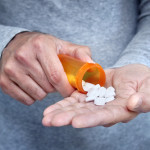Here, Manhattan HIV specialist Howard Grossman, MD, reviews the medical status of activist Marlene Diaz, lately suffering from chronic gastrointestinal (GI) problems and the disfiguring consequences of lipodystrophy, both probably side effects of her medications.
First, it’s important to recognize the severe psychological stress that lipodystrophy can cause—not to mention the great risk that patients will skip drug doses or stop meds completely. All too often doctors ignore this in their happiness that a patient is responding to medications.
Marlene is the victim of a new kind of AIDSphobia—discrimination against “looking like a person with AIDS,” in contrast to the many PWAs visibly restored to shining health by combination therapy. I would remind Marlene that her physical changes do not make her any less valuable or less deserving of love. As a community, we need to support PWAs with lipodystrophy in going on with their lives.
One possibility to ease her fat maldistribution might be to switch her protease inhibitor from nelfinavir (Viracept), which she takes with d4T (Zerit) and 3TC (Epivir), to the newly approved amprenavir (Agenerase). There are theoretical reasons to believe it might cause less lipodystrophy, but no actual comparison study has yet proved this. And since a recent genotypic test found Marlene resistant to 3TC, she may also want to substitute ddI. A new protease inhibitor might turn around her pencil-thin arms and swollen belly, but her facial wasting—caused by the death of fat cells—is probably irreversible.
Regardless of which regimen Marlene is on, I would look for ways to address her GI problems:
DIARRHEA AND CONSTIPATION
Imodium (loperamide) can often control medication-induced diarrhea. Some people prefer to substitute or add Lomotil (diphenoxylate plus atropine). If those don’t work, I might add deodorized tincture of opium or paregoric—old-fashioned remedies that can be effective. Marlene’s diarrhea alternating with constipation could indicate a parasite infection, so I’d order stool tests for ova and parasites, bacteria and yeasts (cultures), Crytosporidium and Isospora. If she was feverish and had taken antibiotics in recent months, I’d look for overgrowth of C. difficile as well. If all the tests are negative, a good GI workup with a colonoscopy may be warranted. AIDS expert Donald Kotler, MD, has found infection with an adherent form of E. coli that may explain much GI distress in PWAs.
UPSET STOMACH, GAS AND BLOATING
I would recommend the following combination approach:
• Improve eating habits. Thorough chewing is a key part of digestion. It sounds simple, but to slow down your eating, put down your fork between bites. Also, if you talk with your mouth full, you swallow more air, causing gas and bloating.
• Change your diet. Marlene’s high-protein, high-calorie menu isn’t enough. To her current breakfast of English muffin and tea, I’d add cereal and have her eat eggs earlier than 10 a.m. so she gets protein first thing in the morning. And I’d cut out the bacon—it’s too difficult to digest. Instead, some fruit at midmorning is a great idea. If you eat fruit with other food, it sits longer in the stomach’s acid bath and rots, creating gas.
Marlene’s typical lunch—a quesadilla with cheese, beans and avocado—is a gas-producing engine. Most people with HIV, especially those on meds, lose the ability to digest lactose, the sugar in dairy products. Lactose intolerance causes gas, bloating and diarrhea—and adding beans doesn’t help. I’d suggest a hot lunch of pasta and a protein source like chicken or fish.
Her current afternoon snack of homemade chicken soup with potatoes, celery and spinach, plus a few pecans, is perfect—mostly protein, some fluids and all easy to digest.
Instead of her standard pasta dinner, I’d include more protein and less carbohydrates (although the spinach and mushrooms she often has are great since they’re low in carbs). At night, the body doesn’t need all the energy provided by carbs, but it needs the protein for repair. And I’d add a later snack to further boost calories.
• Take herbs. A Chinese herbal preparation called Pill Curing and an Ayurvedic (Indian) remedy by Planetary Formulations called Candida Digest may help with gas and bloating. The latter is high in salt, so it should be avoided by hypertensive people.
Treating people with HIV requires a multidisciplinary approach. A patient like Marlene needs to review everything she’s doing: medications, herbs, vitamins, diet and exercise. In the end, she may still be faced with the decision whether to take meds that disfigure her body or to stop and risk disease progression. Unfortunately, given the tools we have now, the choice isn’t easy.
The Protease Prison
She’s down in the dumps with GI misery and fat-gone-haywire.






Comments
Comments